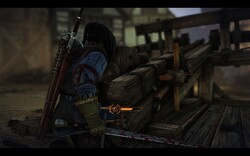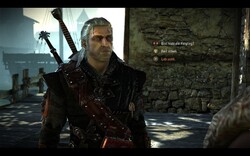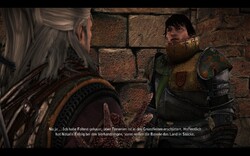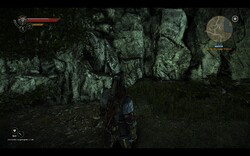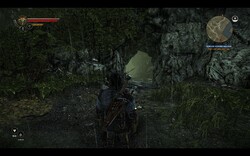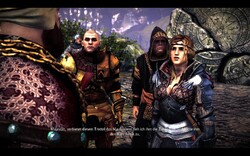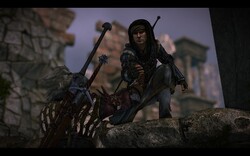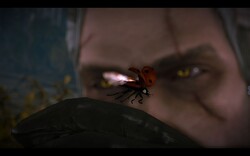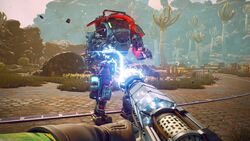Of Monsters, Men and BROche
Of Monsters, Men and BROche
Review - posted by VentilatorOfDoom on Thu 14 July 2011, 19:26:22
Tags: CD Projekt; The Witcher 2: Assassins of Kings[The Witcher 2: Assassins of Kings Review]
Of Monsters, Men and BROche

"Probably a lot of developers that do sequels will tell you that, but we actually wanted to make a game that will have all the features that people loved in The Witcher 1, and everything that people thought was not intuitive or too difficult or too hardcore will at least be better this time around." - Tomasz Gop, Senior Producer
In 2007 Polish developer CD Projekt RED released The Witcher, a fantasy cRPG based on the literary work of Andrzej Sapkowski. The game was universally praised (86 points metascore) for reversing the decline, featuring boobies, and, according to some questionable sources, for singing the blues you’d want to listen.
Unfortunately, the game was far from perfect and had a number of glaring issues. It was too difficult and too hardcore, and what’s worse, it was clearly designed with only PC in mind. It had soon become clear that if the game were to be brought to the wider audience, some things had to be changed.
Therefore, the console version featured a “new interface, redesigned boss battles, redesigned character development system, an entirely new action-oriented combat system, additional motion-capture animations and the ability to directly control Geralt's defensive maneuvers”, but sadly, porting the rest proved to be too difficult.
Lucky for us, these amazing features didn’t die with the console version. CD Projekt was able to cook a new, console-friendly engine (code-named The Best RPG Engine in the World) and load it up with all that console goodness that was so sorely missing from the first game.
Not to be outdone by the latest Bioware offerings, CD Projekt did their best to deliver an open-ended, story-focused, non-linear RPG experience that is about choices and mind blowing consequences. Now, let’s take a look and see what makes the Witcher 2, often described as Dragon Age 2’s killer, tick.
Where we've left...
The game picks up not long after the events of the first game. Geralt had saved Foltest's (King of Temeria) life and now serves reluctantly as Foltest's pet witcher. Whereas the first game had a limited appeal due to a low-key story, this time you're being taken on an epic journey featuring Kings, regicide, worldwide Sorceress-conspiracies, and on-going and upcoming wars. Make no mistake, this time the fate of whole kingdoms rests in your hands. Epic.
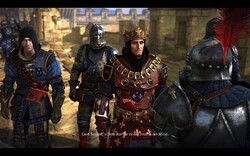
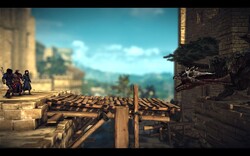

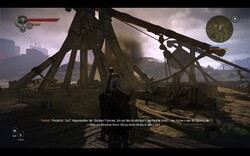
The Prologue paints a fairly impressive picture of a siege, although you will probably ask yourself how Foltest managed to survive that long.
While the extent of Dragon Age 2's influence on Sapkowski’s work isn’t clear, most players will find the gameworld eerily familiar: non-human races like elves and dwarves being treated poorly for no good reason, scheming sorcerers being met with distrust, and religious zealots attempting to widen their influence and maybe even start a little inquisition here and there. Throw in genetically enhanced monster slayers right in middle of it and you’ll get the full picture.
You start the game in prison being accused of Foltest's murder with Vernon Roche, Foltest's favorite special ops dude, interrogating you. The prologue plays out as retrospectives in-between the interrogation cutscenes. While confessing the events of the day to Roche the game gives you an opportunity to familiarize yourself with the controls, teaching the importance of button mashing, hitting the spacebar to dodge, and casting Quen.
The retrospectives show that CD Projekt has become a master of the video game craft. The ratio of gameplay to cutscenes is flawless, raising our hopes that the inevitable sequel will push the definition of multi-platform even further, and will be released on PC, consoles, and movie theaters near you.
The prologue masterfully presents the premise of the game - to find out who the mysterious murderer of Foltest really is, what the true intentions of those kingslayers are, and to wash your good name clean of the false accusation of regicide. Even though it may seem like the world is about to open up, letting you hunt down the murderer on your own and decide where to go next, this isn’t what open ended and non-linear are all about, so we can assure you that you’re in good hands and these hands will never, ever let you go.
Geralt still suffers from amnesia and needs to recover his memories. In the first game you recovered memories by talking to old acquaintances and friends you meet, which wasn’t the best solution, since too much depended on you. In the Witcher 2 the cutscene science has advanced significantly and your memories are being conveniently played back for you when you reach key points of the story. In other words, there is nothing to worry about.
At the end of the prologue, together with Triss Merigold and your new bro Vernon Roche, you set sails towards Chapter 1 where all the open-ended and non-linearity goodness that everyone was talking about is undoubtedly waiting for you.
Look at the Graphics!
Every review of The Witcher 2 needs a chapter on graphics, because not only it’s the best RPG since Dragon Age, it’s also the best looking game in a very long time. This is where the real depth of the game is.

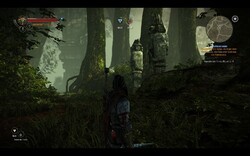


When the CDProjekt guys talked about having invented the best RPG engine in the world they apparently meant the best looking RPG engine.
The game is stunningly beautiful and crafted with love and affection. The amount of detail is mind boggling at times, especially if you have a rig powerful enough to play on maxed out settings. In fact, the Witcher 2’s visuals are a great reason to buy a new computer just to experience the game in all its otherworldly glory.
While we’re on the subjects of graphics, let’s mention the interface. The Witcher had a very old school interface that was too busy and too distractive, with portraits of monsters, key NPCs, and various descriptions. Maybe, just maybe such journals were all the rage when games had wire-frame graphics, but as we’ve mentioned the game is absolutely gorgeous and there is no need to clutter the journal with crude drawings.
Furthermore, in 2007 Mass Effect took the gaming world by storm. A big part of its success was attributed to a revolutionary and convenient list-based inventory. Many players bought the game just to see it and admire its elegant beauty, and we’d like to assure them that the Witcher 2 will not disappoint them. Scrolling through a listbox has never been so much fun.
The Skills of a Witcher

“In Witcher 1 you had a lot of things to invest into. You could invest into attributes, abilities, passive development, magic signs. Here you’ll have a three-way split instead; three roads of development – Witcher Mage, Witcher Alchemist and Witcher Master Swordsman. You can mix the three, but first and foremost, it’s a much simpler system.” - Tomasz Gop, Senior Producer
And thank you for that, Tomasz. As you probably know, the character and combat systems in the first game were needlessly complicated. Let’s identify the key problems first:
Instead of restricting your progress artificially with silver and gold skill points, now you’re free to get any skills, as long as you invest 6 skill points into the Basic training first to unlock 3 other skill trees – Swords, Magic, Alchemy - and meet the prerequisites.
The stats are gone and we can’t thank CD Projekt enough for that. I think we’ve all been in a situation where a game asks you what your Dexterity is going to be and you don’t even know what Dexterity is and why you need it in the first place, if you’re perfectly capable of clicking a few buttons.
Each skill tree has 15 different skills, which can be picked and later upgraded for greater effect. You can’t gain more than 34 skill points during the game, which means that you can’t max a single specialization tree (after spending 6 points to unlock them), which is a wise decision, considering that after upgrading your skills you can kill bosses in 2-3 hits.
Recognizing that it’s important to make RPGs appealing to people who don’t like RPGs, CD Projekt made the game perfectly playable even if you don’t invest a single skill point, which makes sense. After all, Geralt is an accomplished swordfighter and spellcaster, so why should he struggle hitting an enemy that’s right in front of him or struggle dodging like a ninja, masterfully rolling around enemies that are not genetically enhanced? It just doesn’t make sense, does it?
So now the character system is an optional mini-game. Playing it unlocks a lower difficulty mode:




Either being genetically enhanced is more awesome than to be tainted by the blight or Geralt just knows how to get shit done.
You no longer have to change fighting styles. Left mouse button is for fast attacks, right mouse button is for strong attacks. I’d say that the group style is gone, but that would be incorrect. First of all, now that the artificial restrictions are gone, nothing stops you from attacking several enemies at once. However, if you’re a hardcore role-player who only acknowledges abilities that have skills, you can unlock a skill that does damage to multiple enemies. Voila! The problem is solved.
Most skills offer only passive bonuses, so you don’t have to worry about not investing into some vital skill. You either gain more HP, more damage reduction, more damage, and so on.
Two skills worth mentioning are the throwing skills and the top tier (adrenaline) skills of each tree. The throwing skill is your lifeline. For example, a superb silver sword does 17-25 points of damage. A well-balanced silver dagger, which can be thrown from a safe distance and can NOT be blocked does 50-70 points of damage. You can “machine gun” daggers, making short work of your enemies, which makes sense because a genetically enhanced monster slayer should have superior eye-hand coordination.
We’ve seen people claiming that the dagger skill is overpowered and poorly balanced against skills like “+5% to damage”, which would increase your superb silver sword’s damage from 17-25 to 18-26, but they forget that nobody’s forcing them to take less useful skills over overpowered skills, and that their choices of skills will not make Geralt any less awesome.
The adrenaline skills let you build up an adrenaline-meter with your attacks and when it's filled up you can press (X) for something awesome to happen. The swordsman adrenaline skill will trigger a cutscene of Geralt finishing off everyone in the vicinity, the mage ability will trigger a slow-time effect and the alchemy one will allow you to enter a berserk mode which will increase your damage by 30% and will speed up your adrenaline gains. If you have more than one of those skills they'll be cast all at once. Truly epic!
Some skills can be further enhanced by mutagens. Think Diablo 2’s item sockets. Some skills have sockets and you can shove there some mutagens dropped by monsters to increase your strength, which increases your armor since there is no Strength stat anymore, damage, vitality, spell range, and so on. If you like the idea, you should invest in Impregnation – an Alchemy skill that can increase the mutagens’ effect up to 500%. Sweet!
Also, there are in-game perks for doing some deeds. For example, if you spare a certain enemy in the prologue and carry him to safety, you’ll get Strong Back perk, which increases your carry weight by 50 and, considering the amount of junk you’ll have to carry, is probably the most useful skill in the game. Step into campfires (don’t worry, you regenerate health fast, especially out of combat) a few times and earn Pyromaniac perk, which gives you a 20% chance to incinerate your opponents. Can this game be any better?
We are not done yet! There are dialogue skills: Intimidation, Persuasion and Axii (a domination spell). They are increased by using and go up to level 3 each. Every time you use this skill successfully, you skill level goes up, so it’s possible to max at least 2 skills out of 3 in Chapter 1. If you fail to increase your skills or if you’re even surprised to learn that the game has dialogue skills, don’t worry as the skills don’t affect much and won’t prevent you from getting and completing quests. Still, they add some flavor and give you more choices, which is what the game is all about. It’s nice to see that CD Projekt doesn’t forget the hardcore audience and can rock old school every now and then.
The Joys of Witcher's Work


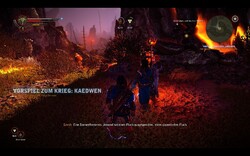

"So in The Witcher 2, there is a lot of complexity, at least as much as in The Witcher, but you don’t have to do it immediately. There are no time-based clicking sequences; if you want to do combos, they are advanced. You can find out how to do fast and strong strikes, how to throw magic in between the strikes, and so on and so on, but you don’t have to. You can just mash your button and you will swipe through the combat if you want to." - Tomasz Gop, Senior Producer
“So it's time that we, as a genre, took a look at some of those elements that action games have done exceptionally well and asked what we can learn from them.” - Mike Laidlaw
The new combat system is a step up from the first game’s round-based system, as far as involvement and fun are concerned. You no longer have to wait for the icon to flash signaling you to attack or be a hostage of your character’s humble abilities.
Now, with all the advanced complexity at your disposal, you can decide whether to throw daggers or bombs, whether to use your signs and circle your opponents menacingly, while waiting for your vigor to recharge, or if you want to be where the action is and think that your fingers are fast enough, then just jump in and mash the buttons while hitting spacebar at random intervals.
While some opponents are fairly easy, be warned that some opponents are almost impossible to defeat even on Normal without the use of advanced tactics. Take the shield bearers, for example. The only way to beat them are either to hit the spacebar, roll behind them, and while they look around wondering where you went, stab them in the back, or to hit E to block, wait for him to attack you getting staggered in the process, then quickly hit him twice, rinse and repeat. It’s a bit too complex and we are well aware that many people have found it very challenging, being thoroughly confused as to whether to press E or spacebar in the heat of a battle, which, of course, is completely understandable. It’s clearly a case of too much catering to the hardcore audience.
On the plus side, the combat system is very accessible and welcoming, very remotely resembling combat traditionally found in RPGs, so if you just want to kill some monsters and/or enjoy a well crafted story and sex up some ladies, we can assure you that the character system won’t get in the way of your enjoyment.
A Witcher and His Environment



"Quick-time events will be another innovation!” Marek Ziemak, one of TW2 designers
“Remember when games didn't have quick time events? That was so great.” Random internet post.
When it comes to interacting with the environment and its inhabitants, the Witcher 2 is truly without equal. Take boss battles, for example.
In most RPGs all you can do is approach a monster and attack its health bar, while pretending that you’re slashing, dodging, jumping, and yelling “Die! Die! Die!” In the Witcher 2 battling bosses is a cinematic, adrenaline-filled battle guaranteed to keep you on the edge of your seat. Your options seem truly limitless. You can chop off a monster’s tentacles – at conveniently marked spots, then jump on one you didn’t cut, hacking at it with righteous fury for some odd but incredibly cinematic reasons, jump off at the last minute, run up a bridge above the monster, and toss a grenade at him. Take that, Kratos! Needless to say, if your environment interaction skills aren’t up to par and you fail to interact with the environment in a timely manner, you’ll have to repeat this exciting, cinematic, adrenaline-filled, edge of the seat keeping sequence all over again. And again, and again, and again.
We are not complaining though, as this sequence only gets better every time you go through it and discover new nuances. If you know your RPGs, then you’ll probably agree with me that only Resident Evil 4 and God of War 2 handled the interaction with the gameworld better, so the Witcher 2 is definitely in a good company.
Surprisingly, the interactivity doesn’t stop at boss fights. You can fist fight and arm wrestle with selected characters, which puts more skills to the test than does any other RPG in existence. The fist fighting tests your reflexes, practically removing the boundaries between you and your character. As Geralt watches his opponents, you’ll be watching flashing letters and quickly pressing A or D or even W and then quickly A, to be rewarded by mini-cutscenes of Geralt kicking ass. The arm wrestling game tests your ability to work your mouse. Only a true master of this seemingly simple yet incredibly hard to control device will become the game’s arm wrestling champion.
The Witchery Art of Alchemy
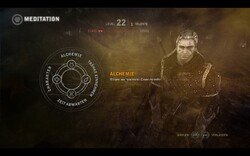



The process of brewing potions, an essential part of any high-level monster hunting, is also being simplified for those who just want to get on with the action, while players who like to experiment will still be able to do so. "We've made alchemy be a mini-game. You can manually influence the process of brewing a potion in order to get something unique," Tomasz Gop explained. "But then, again, you don't have to - the default alchemy is much simpler than in The Witcher."
Simplification, clearly, was the main theme during the development and it shows. Everything is so … pleasantly simple and welcoming. Once you start playing, it’s almost impossible to stop.
To make potions, bombs, and oils, you need recipes and ingredients. The ingredients (plants and monster parts) will be available for harvesting while strolling the countryside killing things. The recipes could be acquired from merchants and chests.
Most of the potions from the first game are still present (often slightly altered in effect), but there are a lot of new ones as well. The secondary effects of potions (albedo, nigredo etc) and different bases are gone, greatly streamlining the experience. Considering that you can't drink potions during combat and that some fights start after lengthy cutscenes, after which your potion timers either run out already or are close to expiring, it’s easy to wonder if, perhaps, fixing what wasn’t really broken is a good idea.
You get a surprisingly large variety of bombs, which can be thrown as easily and as fast as daggers, and can quickly turn even a boss battle into a cakewalk. The oils were toned down and aren’t as useful this time around. Spirit Oil, for example (useful against spirits like wraiths, etc), did bestow +100% damage vs spirits in The Witcher, but in the sequel it does merely +20% damage, which means that a sword with 12-20 points of damage will be doing 14-24 points of damage instead.
Crafting works very similarly, but instead of putting items together yourself, you pay smiths and craftsmen to do that for you, using your recipes and components. You can craft swords, armor, throwing weapons, and pre-requisite components like hardened leather. Some items have sockets and can be further improved with special upgrade items for armor and runes for swords.
Weapons and armor follow a very convenient linear progression, so items and recipes from a new chapter make even the epic (that’s the name) items crafted in the previous chapter look like garbage. So, when you get to new chapter, first thing you do is go and sell your existing gear, buy all new recipes and components, craft better gear, go do the witcher thing and kill some monsters.
The Epic of a Witcher's Story [or The Chosen One Must Choose]




"We have 16 different endings and a lot of quests are non-linear, a lot of quests branch from the very beginning and some of the endings from these quests are locked-out from you. A lot of quests can be completed or finished in many different ways sooner or later on different levels of the game and so on." - Tomasz Gop, Senior Producer
First of all, don’t panic. “Many different ways” clearly means something different in Polish than it does in English. Same goes for non-linear. What Tomasz wanted to say is that a lot of quests are delightfully straightforward and can be completed in a very specific way. Usually, you get a quest from NPC A, then you run to NPC B who gives you more info, then you go to location X and kill something. Sometimes going to NPC B is completely optional, which means that you go to location X and kill something without having all the info. But I digress… Let’s start at the beginning.
With the Witcher 2 CD Projekt has cleverly reminded us that computer role-playing games have evolved from adventure games and taken us back to the roots. The Witcher 2 is a story-driven game first and foremost, which means that some sacrifices had to be made. For example, you can’t kill NPCs who aren’t meant to be killed just yet or at all (which you’d, obviously, have no way of knowing), but the story is too good and well worth all the restrictions it places on you.
Let’s take a look at just one example of how the players’ reckless decisions could have ruined this masterpiece. When you track down Letho the evil assassin with a heart of gold, you have no choice but to fight him no matter what you tell him because the story demands a cinematic battle. However, the story also demands that Letho survives the cinematic battle, so when he’s almost dead, he’ll jump up, disarm you and spare YOUR life, giving you a small glimpse into that heart of gold of his. What a surprising twist of events, eh? The story is a regular roller-coaster, I can tell you that much.
Letho isn’t the only interesting and multi-dimensional character. On your voyage to discover the reason behind the regicides you'll encounter a lot of intriguing characters with their own believable agendas. You will encounter the Kings of Temeria, Aedirn, Kaedwen and Redania plus the leaders of the Scoiatel, of the Vergen revolution and the sorceress-conspiracy and often your epic actions decide over their rise or fall. The sorceresses want to take over the rule in the north and the game portrays them as horrible bitches. Yet after having met the Kings, you’ll understand the difference between evil and lesser evil much better.
The game offers you a lot of moral choices: should you kill a pre-selected and pre-screened dude whose death will not affect anything or not? For instance:
At the beginning of the game, while helping King Foltest to bring justice to the besieged traitors you will encounter Arjan La Vallette, the leader of the rebells. Here you will get a first taste of the choices you're going to encounter in The Witcher 2. You can duel him one-on-one, kill him and all his men, or talk him into surrendering. In case he survives you'll meet him again later and can exchange 2 or 3 sentences with him. Most importantly though, if he still lives, he’ll be featured in a prison cutscene that unlocks a door to freedom. If you killed him earlier (no, you can’t kill him in prison; killing is serious business and you can’t just ran around killing people when you feel like it), his mother will boldly take his place in that cutscene. The door to freedom and grand adventures will be opened regardless of your choices, and so while you can’t choose how you escape, you can choose the NPC in the cutscene, and that, my friend, is what storytelling is all about.
Another interesting example is the “Malena” quest. Malena is an oppressed elf who’s been making a living by luring human soldiers into ambushes. When you’re called to investigate the recent slaying, you can either help her get away with it or accuse her of being involved. If you accuse her, she’ll lead you into an ambush. If you’re a nature-loving, elf-hugging guy, you can help her get away with it, in which case she … What? Lead you to the elf leader? Help you join the elves? No, silly. Leading you to the elf leader is the dwarf’s job and he can only do it after you slay the chapter’s monster boss, which you can only do after you gather the mucus, which you can only do after the appropriate cutscene, which only kicks in after… Well, what I’m trying to say is that it’s a non-linear game, goddammit. Pay attention, will ya? Anyway, if you accuse Malena, she’ll lead you into an ambush, if you help her, she’ll lead you into another ambush. Fucking elves, eh? However, the difference is that if you pick option B, you can actually kill her, let her go (hopefully to plot another ambush) or hand her over to the authorities. Just think of all the non-linear iterations this quest provides on so many different levels. Reminds me of that quest in Dragon Age 2…
Or take the smuggler quest. In a typically non-linear manner the entry to their cave only appears when the game tells you to go there. Yet you get to make a choice. Do you get them the genuine formula or a false one. In the latter case you can again decide to seek their lair yourself and kill them all or to go there together with their leader blindfolded and then kill them all. The possibilities are literally endless.
But the best example that shows the game’s brilliant design is the armor of courage quest. You’re told about yet another conspiracy and that you need a coin to get in. You have two ways to acquire the coin: find a drunkard and reunite him with his friends or kill a master swordsman who, unlike Geralt, hasn’t mastered the art of dodging and is, therefore, a sitting duck. Once you acquire the coin, you give the coin to the right NPC (no opportunities to try your mind trick spell or persuasion on her) and go into a cellar, where, after a short conversation and futile attempts to tell the NPC to just hand you the armor (no persuasion, intimidation, or domination skills there, which makes sense because these are important skills that can’t be used willy-nilly, whenever you feel like it), you get attacked and have no choice but to kill them all.
So once again, CD Projekt manages to satisfy both camps. The hardcore audience is pleased with a choice, and the casual audience is pleased because the choice is meaningless. Bra-vo!
Now, I assume that you’ve all heard rumors about The Big Choice™, which dramatically changes the entire game. It’s true. At the end of chapter 1 you’ll be offered to make the most important choice – which location you’d like to visit in Chapter 2: Henselt's war camp or the city of Vergen. Whereas most RPGs allow you to visit different places freely, CD Project redefines the genre once again by introducing this very important choice – left or right.
While it may seem like that you’re choosing sides in a conflict or that the game is wildly non-linear, we’d like to reassure you that CD Project knows that such things are very confusing, so you’ll merely choose which linear adventure path to follow.
Each hub comes with their own quests and introduces you to different characters. When you're with Henselt you will, for example, never know much about Philippa Eilhart or Saskia or Stennis, whereas when in Vergen you'll never get to know much about Dethmold or Sabrina Glevessig. Different camps offer different mileage. The left path offers 6 character levels worth of quests more than the right path, so choose wisely.
Still confused? I don’t blame you. Imagine, if you will, a typical RPG setup: there is a conflict, and you’re able to travel to different places to meet different characters, learn more about them and the conflict, and make, so to speak, an informed decision. A-la Gothic, for example. In the Witcher 2 you’re offered to make a choice before you know anything. Left or right. Heads or tails. The camp or the town. Thus, it’s your uninformed choice that determines where you go and whom you’d talk to. Truly, an RPG redefined.
Jeszcze Polska nie zginęła!

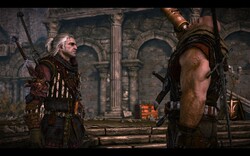


“I can’t say specifically whether it’s Heavy Rain, Demon’s Souls or Arkham Asylum that has inspired us most over the past few years – it’s probably a mix of all of them.” - Tomasz Gop, Senior Producer
The Witcher 2 is undoubtedly a product of love, which is a rare thing these days, so in the end it doesn’t really matter what kind of game is it, how linear or non-linear it is, and whether or not the choices matter. Most importantly, it is a game worth playing.
Even though the faults are glaring, the game is more than the sum of its flawed parts, which is what makes it an enjoyable experience overall, whether you play it as RPG or as an action-adventure game.
CD Projekt didn’t build on the Witcher’s formula and design foundation. Instead they’ve tried something different, which, sadly, has shown the first sign of abandoning the hardcore audience and going after a larger market. While business is business, we can only hope that CD Projekt will go back to making RPGs and will pick more appropriate inspirations for the third game than Heavy Rain and Goddamn Batman.
Of Monsters, Men and BROche

"Probably a lot of developers that do sequels will tell you that, but we actually wanted to make a game that will have all the features that people loved in The Witcher 1, and everything that people thought was not intuitive or too difficult or too hardcore will at least be better this time around." - Tomasz Gop, Senior Producer
Unfortunately, the game was far from perfect and had a number of glaring issues. It was too difficult and too hardcore, and what’s worse, it was clearly designed with only PC in mind. It had soon become clear that if the game were to be brought to the wider audience, some things had to be changed.
Therefore, the console version featured a “new interface, redesigned boss battles, redesigned character development system, an entirely new action-oriented combat system, additional motion-capture animations and the ability to directly control Geralt's defensive maneuvers”, but sadly, porting the rest proved to be too difficult.
Lucky for us, these amazing features didn’t die with the console version. CD Projekt was able to cook a new, console-friendly engine (code-named The Best RPG Engine in the World) and load it up with all that console goodness that was so sorely missing from the first game.
Not to be outdone by the latest Bioware offerings, CD Projekt did their best to deliver an open-ended, story-focused, non-linear RPG experience that is about choices and mind blowing consequences. Now, let’s take a look and see what makes the Witcher 2, often described as Dragon Age 2’s killer, tick.
Where we've left...
The game picks up not long after the events of the first game. Geralt had saved Foltest's (King of Temeria) life and now serves reluctantly as Foltest's pet witcher. Whereas the first game had a limited appeal due to a low-key story, this time you're being taken on an epic journey featuring Kings, regicide, worldwide Sorceress-conspiracies, and on-going and upcoming wars. Make no mistake, this time the fate of whole kingdoms rests in your hands. Epic.




The Prologue paints a fairly impressive picture of a siege, although you will probably ask yourself how Foltest managed to survive that long.
You start the game in prison being accused of Foltest's murder with Vernon Roche, Foltest's favorite special ops dude, interrogating you. The prologue plays out as retrospectives in-between the interrogation cutscenes. While confessing the events of the day to Roche the game gives you an opportunity to familiarize yourself with the controls, teaching the importance of button mashing, hitting the spacebar to dodge, and casting Quen.
The retrospectives show that CD Projekt has become a master of the video game craft. The ratio of gameplay to cutscenes is flawless, raising our hopes that the inevitable sequel will push the definition of multi-platform even further, and will be released on PC, consoles, and movie theaters near you.
The prologue masterfully presents the premise of the game - to find out who the mysterious murderer of Foltest really is, what the true intentions of those kingslayers are, and to wash your good name clean of the false accusation of regicide. Even though it may seem like the world is about to open up, letting you hunt down the murderer on your own and decide where to go next, this isn’t what open ended and non-linear are all about, so we can assure you that you’re in good hands and these hands will never, ever let you go.
Geralt still suffers from amnesia and needs to recover his memories. In the first game you recovered memories by talking to old acquaintances and friends you meet, which wasn’t the best solution, since too much depended on you. In the Witcher 2 the cutscene science has advanced significantly and your memories are being conveniently played back for you when you reach key points of the story. In other words, there is nothing to worry about.
At the end of the prologue, together with Triss Merigold and your new bro Vernon Roche, you set sails towards Chapter 1 where all the open-ended and non-linearity goodness that everyone was talking about is undoubtedly waiting for you.
Look at the Graphics!
Every review of The Witcher 2 needs a chapter on graphics, because not only it’s the best RPG since Dragon Age, it’s also the best looking game in a very long time. This is where the real depth of the game is.




When the CDProjekt guys talked about having invented the best RPG engine in the world they apparently meant the best looking RPG engine.
The game is stunningly beautiful and crafted with love and affection. The amount of detail is mind boggling at times, especially if you have a rig powerful enough to play on maxed out settings. In fact, the Witcher 2’s visuals are a great reason to buy a new computer just to experience the game in all its otherworldly glory.
While we’re on the subjects of graphics, let’s mention the interface. The Witcher had a very old school interface that was too busy and too distractive, with portraits of monsters, key NPCs, and various descriptions. Maybe, just maybe such journals were all the rage when games had wire-frame graphics, but as we’ve mentioned the game is absolutely gorgeous and there is no need to clutter the journal with crude drawings.
Furthermore, in 2007 Mass Effect took the gaming world by storm. A big part of its success was attributed to a revolutionary and convenient list-based inventory. Many players bought the game just to see it and admire its elegant beauty, and we’d like to assure them that the Witcher 2 will not disappoint them. Scrolling through a listbox has never been so much fun.
The Skills of a Witcher

“In Witcher 1 you had a lot of things to invest into. You could invest into attributes, abilities, passive development, magic signs. Here you’ll have a three-way split instead; three roads of development – Witcher Mage, Witcher Alchemist and Witcher Master Swordsman. You can mix the three, but first and foremost, it’s a much simpler system.” - Tomasz Gop, Senior Producer
- You had bronze, silver, and gold skill points. Need I say more?
- You had two swords, 3 combat styles, which had to be switched manually, and separate skills for each, so you could, for example, increase your steel sword attacks against multiple enemies. In that end that means that you have hundreds of possible combinations, which made the game nigh unplayable.
- You had to wait for the icon to flash to attack again, which was a throwback to turn-based games. Instead of making the player an active participant in a battle, it made him an observer.
Instead of restricting your progress artificially with silver and gold skill points, now you’re free to get any skills, as long as you invest 6 skill points into the Basic training first to unlock 3 other skill trees – Swords, Magic, Alchemy - and meet the prerequisites.
The stats are gone and we can’t thank CD Projekt enough for that. I think we’ve all been in a situation where a game asks you what your Dexterity is going to be and you don’t even know what Dexterity is and why you need it in the first place, if you’re perfectly capable of clicking a few buttons.
Each skill tree has 15 different skills, which can be picked and later upgraded for greater effect. You can’t gain more than 34 skill points during the game, which means that you can’t max a single specialization tree (after spending 6 points to unlock them), which is a wise decision, considering that after upgrading your skills you can kill bosses in 2-3 hits.
Recognizing that it’s important to make RPGs appealing to people who don’t like RPGs, CD Projekt made the game perfectly playable even if you don’t invest a single skill point, which makes sense. After all, Geralt is an accomplished swordfighter and spellcaster, so why should he struggle hitting an enemy that’s right in front of him or struggle dodging like a ninja, masterfully rolling around enemies that are not genetically enhanced? It just doesn’t make sense, does it?
So now the character system is an optional mini-game. Playing it unlocks a lower difficulty mode:
- Easy – invest skill points and truly FEEL what it is like to be a killing machine, the best of the best (because only the best survive the transformation process).
- Normal – ignore the character system and play a challenging but still easy and enjoyable game.




Either being genetically enhanced is more awesome than to be tainted by the blight or Geralt just knows how to get shit done.
You no longer have to change fighting styles. Left mouse button is for fast attacks, right mouse button is for strong attacks. I’d say that the group style is gone, but that would be incorrect. First of all, now that the artificial restrictions are gone, nothing stops you from attacking several enemies at once. However, if you’re a hardcore role-player who only acknowledges abilities that have skills, you can unlock a skill that does damage to multiple enemies. Voila! The problem is solved.
Most skills offer only passive bonuses, so you don’t have to worry about not investing into some vital skill. You either gain more HP, more damage reduction, more damage, and so on.
Two skills worth mentioning are the throwing skills and the top tier (adrenaline) skills of each tree. The throwing skill is your lifeline. For example, a superb silver sword does 17-25 points of damage. A well-balanced silver dagger, which can be thrown from a safe distance and can NOT be blocked does 50-70 points of damage. You can “machine gun” daggers, making short work of your enemies, which makes sense because a genetically enhanced monster slayer should have superior eye-hand coordination.
We’ve seen people claiming that the dagger skill is overpowered and poorly balanced against skills like “+5% to damage”, which would increase your superb silver sword’s damage from 17-25 to 18-26, but they forget that nobody’s forcing them to take less useful skills over overpowered skills, and that their choices of skills will not make Geralt any less awesome.
The adrenaline skills let you build up an adrenaline-meter with your attacks and when it's filled up you can press (X) for something awesome to happen. The swordsman adrenaline skill will trigger a cutscene of Geralt finishing off everyone in the vicinity, the mage ability will trigger a slow-time effect and the alchemy one will allow you to enter a berserk mode which will increase your damage by 30% and will speed up your adrenaline gains. If you have more than one of those skills they'll be cast all at once. Truly epic!
Some skills can be further enhanced by mutagens. Think Diablo 2’s item sockets. Some skills have sockets and you can shove there some mutagens dropped by monsters to increase your strength, which increases your armor since there is no Strength stat anymore, damage, vitality, spell range, and so on. If you like the idea, you should invest in Impregnation – an Alchemy skill that can increase the mutagens’ effect up to 500%. Sweet!
Also, there are in-game perks for doing some deeds. For example, if you spare a certain enemy in the prologue and carry him to safety, you’ll get Strong Back perk, which increases your carry weight by 50 and, considering the amount of junk you’ll have to carry, is probably the most useful skill in the game. Step into campfires (don’t worry, you regenerate health fast, especially out of combat) a few times and earn Pyromaniac perk, which gives you a 20% chance to incinerate your opponents. Can this game be any better?
We are not done yet! There are dialogue skills: Intimidation, Persuasion and Axii (a domination spell). They are increased by using and go up to level 3 each. Every time you use this skill successfully, you skill level goes up, so it’s possible to max at least 2 skills out of 3 in Chapter 1. If you fail to increase your skills or if you’re even surprised to learn that the game has dialogue skills, don’t worry as the skills don’t affect much and won’t prevent you from getting and completing quests. Still, they add some flavor and give you more choices, which is what the game is all about. It’s nice to see that CD Projekt doesn’t forget the hardcore audience and can rock old school every now and then.
The Joys of Witcher's Work




"So in The Witcher 2, there is a lot of complexity, at least as much as in The Witcher, but you don’t have to do it immediately. There are no time-based clicking sequences; if you want to do combos, they are advanced. You can find out how to do fast and strong strikes, how to throw magic in between the strikes, and so on and so on, but you don’t have to. You can just mash your button and you will swipe through the combat if you want to." - Tomasz Gop, Senior Producer
“So it's time that we, as a genre, took a look at some of those elements that action games have done exceptionally well and asked what we can learn from them.” - Mike Laidlaw
The new combat system is a step up from the first game’s round-based system, as far as involvement and fun are concerned. You no longer have to wait for the icon to flash signaling you to attack or be a hostage of your character’s humble abilities.
Now, with all the advanced complexity at your disposal, you can decide whether to throw daggers or bombs, whether to use your signs and circle your opponents menacingly, while waiting for your vigor to recharge, or if you want to be where the action is and think that your fingers are fast enough, then just jump in and mash the buttons while hitting spacebar at random intervals.
While some opponents are fairly easy, be warned that some opponents are almost impossible to defeat even on Normal without the use of advanced tactics. Take the shield bearers, for example. The only way to beat them are either to hit the spacebar, roll behind them, and while they look around wondering where you went, stab them in the back, or to hit E to block, wait for him to attack you getting staggered in the process, then quickly hit him twice, rinse and repeat. It’s a bit too complex and we are well aware that many people have found it very challenging, being thoroughly confused as to whether to press E or spacebar in the heat of a battle, which, of course, is completely understandable. It’s clearly a case of too much catering to the hardcore audience.
On the plus side, the combat system is very accessible and welcoming, very remotely resembling combat traditionally found in RPGs, so if you just want to kill some monsters and/or enjoy a well crafted story and sex up some ladies, we can assure you that the character system won’t get in the way of your enjoyment.
A Witcher and His Environment



"Quick-time events will be another innovation!” Marek Ziemak, one of TW2 designers
“Remember when games didn't have quick time events? That was so great.” Random internet post.
When it comes to interacting with the environment and its inhabitants, the Witcher 2 is truly without equal. Take boss battles, for example.
In most RPGs all you can do is approach a monster and attack its health bar, while pretending that you’re slashing, dodging, jumping, and yelling “Die! Die! Die!” In the Witcher 2 battling bosses is a cinematic, adrenaline-filled battle guaranteed to keep you on the edge of your seat. Your options seem truly limitless. You can chop off a monster’s tentacles – at conveniently marked spots, then jump on one you didn’t cut, hacking at it with righteous fury for some odd but incredibly cinematic reasons, jump off at the last minute, run up a bridge above the monster, and toss a grenade at him. Take that, Kratos! Needless to say, if your environment interaction skills aren’t up to par and you fail to interact with the environment in a timely manner, you’ll have to repeat this exciting, cinematic, adrenaline-filled, edge of the seat keeping sequence all over again. And again, and again, and again.
We are not complaining though, as this sequence only gets better every time you go through it and discover new nuances. If you know your RPGs, then you’ll probably agree with me that only Resident Evil 4 and God of War 2 handled the interaction with the gameworld better, so the Witcher 2 is definitely in a good company.
Surprisingly, the interactivity doesn’t stop at boss fights. You can fist fight and arm wrestle with selected characters, which puts more skills to the test than does any other RPG in existence. The fist fighting tests your reflexes, practically removing the boundaries between you and your character. As Geralt watches his opponents, you’ll be watching flashing letters and quickly pressing A or D or even W and then quickly A, to be rewarded by mini-cutscenes of Geralt kicking ass. The arm wrestling game tests your ability to work your mouse. Only a true master of this seemingly simple yet incredibly hard to control device will become the game’s arm wrestling champion.
The Witchery Art of Alchemy




The process of brewing potions, an essential part of any high-level monster hunting, is also being simplified for those who just want to get on with the action, while players who like to experiment will still be able to do so. "We've made alchemy be a mini-game. You can manually influence the process of brewing a potion in order to get something unique," Tomasz Gop explained. "But then, again, you don't have to - the default alchemy is much simpler than in The Witcher."
Simplification, clearly, was the main theme during the development and it shows. Everything is so … pleasantly simple and welcoming. Once you start playing, it’s almost impossible to stop.
To make potions, bombs, and oils, you need recipes and ingredients. The ingredients (plants and monster parts) will be available for harvesting while strolling the countryside killing things. The recipes could be acquired from merchants and chests.
Most of the potions from the first game are still present (often slightly altered in effect), but there are a lot of new ones as well. The secondary effects of potions (albedo, nigredo etc) and different bases are gone, greatly streamlining the experience. Considering that you can't drink potions during combat and that some fights start after lengthy cutscenes, after which your potion timers either run out already or are close to expiring, it’s easy to wonder if, perhaps, fixing what wasn’t really broken is a good idea.
You get a surprisingly large variety of bombs, which can be thrown as easily and as fast as daggers, and can quickly turn even a boss battle into a cakewalk. The oils were toned down and aren’t as useful this time around. Spirit Oil, for example (useful against spirits like wraiths, etc), did bestow +100% damage vs spirits in The Witcher, but in the sequel it does merely +20% damage, which means that a sword with 12-20 points of damage will be doing 14-24 points of damage instead.
Crafting works very similarly, but instead of putting items together yourself, you pay smiths and craftsmen to do that for you, using your recipes and components. You can craft swords, armor, throwing weapons, and pre-requisite components like hardened leather. Some items have sockets and can be further improved with special upgrade items for armor and runes for swords.
Weapons and armor follow a very convenient linear progression, so items and recipes from a new chapter make even the epic (that’s the name) items crafted in the previous chapter look like garbage. So, when you get to new chapter, first thing you do is go and sell your existing gear, buy all new recipes and components, craft better gear, go do the witcher thing and kill some monsters.
The Epic of a Witcher's Story [or The Chosen One Must Choose]




"We have 16 different endings and a lot of quests are non-linear, a lot of quests branch from the very beginning and some of the endings from these quests are locked-out from you. A lot of quests can be completed or finished in many different ways sooner or later on different levels of the game and so on." - Tomasz Gop, Senior Producer
First of all, don’t panic. “Many different ways” clearly means something different in Polish than it does in English. Same goes for non-linear. What Tomasz wanted to say is that a lot of quests are delightfully straightforward and can be completed in a very specific way. Usually, you get a quest from NPC A, then you run to NPC B who gives you more info, then you go to location X and kill something. Sometimes going to NPC B is completely optional, which means that you go to location X and kill something without having all the info. But I digress… Let’s start at the beginning.
With the Witcher 2 CD Projekt has cleverly reminded us that computer role-playing games have evolved from adventure games and taken us back to the roots. The Witcher 2 is a story-driven game first and foremost, which means that some sacrifices had to be made. For example, you can’t kill NPCs who aren’t meant to be killed just yet or at all (which you’d, obviously, have no way of knowing), but the story is too good and well worth all the restrictions it places on you.
Let’s take a look at just one example of how the players’ reckless decisions could have ruined this masterpiece. When you track down Letho the evil assassin with a heart of gold, you have no choice but to fight him no matter what you tell him because the story demands a cinematic battle. However, the story also demands that Letho survives the cinematic battle, so when he’s almost dead, he’ll jump up, disarm you and spare YOUR life, giving you a small glimpse into that heart of gold of his. What a surprising twist of events, eh? The story is a regular roller-coaster, I can tell you that much.
Letho isn’t the only interesting and multi-dimensional character. On your voyage to discover the reason behind the regicides you'll encounter a lot of intriguing characters with their own believable agendas. You will encounter the Kings of Temeria, Aedirn, Kaedwen and Redania plus the leaders of the Scoiatel, of the Vergen revolution and the sorceress-conspiracy and often your epic actions decide over their rise or fall. The sorceresses want to take over the rule in the north and the game portrays them as horrible bitches. Yet after having met the Kings, you’ll understand the difference between evil and lesser evil much better.
The game offers you a lot of moral choices: should you kill a pre-selected and pre-screened dude whose death will not affect anything or not? For instance:
At the beginning of the game, while helping King Foltest to bring justice to the besieged traitors you will encounter Arjan La Vallette, the leader of the rebells. Here you will get a first taste of the choices you're going to encounter in The Witcher 2. You can duel him one-on-one, kill him and all his men, or talk him into surrendering. In case he survives you'll meet him again later and can exchange 2 or 3 sentences with him. Most importantly though, if he still lives, he’ll be featured in a prison cutscene that unlocks a door to freedom. If you killed him earlier (no, you can’t kill him in prison; killing is serious business and you can’t just ran around killing people when you feel like it), his mother will boldly take his place in that cutscene. The door to freedom and grand adventures will be opened regardless of your choices, and so while you can’t choose how you escape, you can choose the NPC in the cutscene, and that, my friend, is what storytelling is all about.
Another interesting example is the “Malena” quest. Malena is an oppressed elf who’s been making a living by luring human soldiers into ambushes. When you’re called to investigate the recent slaying, you can either help her get away with it or accuse her of being involved. If you accuse her, she’ll lead you into an ambush. If you’re a nature-loving, elf-hugging guy, you can help her get away with it, in which case she … What? Lead you to the elf leader? Help you join the elves? No, silly. Leading you to the elf leader is the dwarf’s job and he can only do it after you slay the chapter’s monster boss, which you can only do after you gather the mucus, which you can only do after the appropriate cutscene, which only kicks in after… Well, what I’m trying to say is that it’s a non-linear game, goddammit. Pay attention, will ya? Anyway, if you accuse Malena, she’ll lead you into an ambush, if you help her, she’ll lead you into another ambush. Fucking elves, eh? However, the difference is that if you pick option B, you can actually kill her, let her go (hopefully to plot another ambush) or hand her over to the authorities. Just think of all the non-linear iterations this quest provides on so many different levels. Reminds me of that quest in Dragon Age 2…
Or take the smuggler quest. In a typically non-linear manner the entry to their cave only appears when the game tells you to go there. Yet you get to make a choice. Do you get them the genuine formula or a false one. In the latter case you can again decide to seek their lair yourself and kill them all or to go there together with their leader blindfolded and then kill them all. The possibilities are literally endless.
But the best example that shows the game’s brilliant design is the armor of courage quest. You’re told about yet another conspiracy and that you need a coin to get in. You have two ways to acquire the coin: find a drunkard and reunite him with his friends or kill a master swordsman who, unlike Geralt, hasn’t mastered the art of dodging and is, therefore, a sitting duck. Once you acquire the coin, you give the coin to the right NPC (no opportunities to try your mind trick spell or persuasion on her) and go into a cellar, where, after a short conversation and futile attempts to tell the NPC to just hand you the armor (no persuasion, intimidation, or domination skills there, which makes sense because these are important skills that can’t be used willy-nilly, whenever you feel like it), you get attacked and have no choice but to kill them all.
So once again, CD Projekt manages to satisfy both camps. The hardcore audience is pleased with a choice, and the casual audience is pleased because the choice is meaningless. Bra-vo!
Now, I assume that you’ve all heard rumors about The Big Choice™, which dramatically changes the entire game. It’s true. At the end of chapter 1 you’ll be offered to make the most important choice – which location you’d like to visit in Chapter 2: Henselt's war camp or the city of Vergen. Whereas most RPGs allow you to visit different places freely, CD Project redefines the genre once again by introducing this very important choice – left or right.
While it may seem like that you’re choosing sides in a conflict or that the game is wildly non-linear, we’d like to reassure you that CD Project knows that such things are very confusing, so you’ll merely choose which linear adventure path to follow.
Each hub comes with their own quests and introduces you to different characters. When you're with Henselt you will, for example, never know much about Philippa Eilhart or Saskia or Stennis, whereas when in Vergen you'll never get to know much about Dethmold or Sabrina Glevessig. Different camps offer different mileage. The left path offers 6 character levels worth of quests more than the right path, so choose wisely.
Still confused? I don’t blame you. Imagine, if you will, a typical RPG setup: there is a conflict, and you’re able to travel to different places to meet different characters, learn more about them and the conflict, and make, so to speak, an informed decision. A-la Gothic, for example. In the Witcher 2 you’re offered to make a choice before you know anything. Left or right. Heads or tails. The camp or the town. Thus, it’s your uninformed choice that determines where you go and whom you’d talk to. Truly, an RPG redefined.
Jeszcze Polska nie zginęła!




“I can’t say specifically whether it’s Heavy Rain, Demon’s Souls or Arkham Asylum that has inspired us most over the past few years – it’s probably a mix of all of them.” - Tomasz Gop, Senior Producer
The Witcher 2 is undoubtedly a product of love, which is a rare thing these days, so in the end it doesn’t really matter what kind of game is it, how linear or non-linear it is, and whether or not the choices matter. Most importantly, it is a game worth playing.
Even though the faults are glaring, the game is more than the sum of its flawed parts, which is what makes it an enjoyable experience overall, whether you play it as RPG or as an action-adventure game.
CD Projekt didn’t build on the Witcher’s formula and design foundation. Instead they’ve tried something different, which, sadly, has shown the first sign of abandoning the hardcore audience and going after a larger market. While business is business, we can only hope that CD Projekt will go back to making RPGs and will pick more appropriate inspirations for the third game than Heavy Rain and Goddamn Batman.




